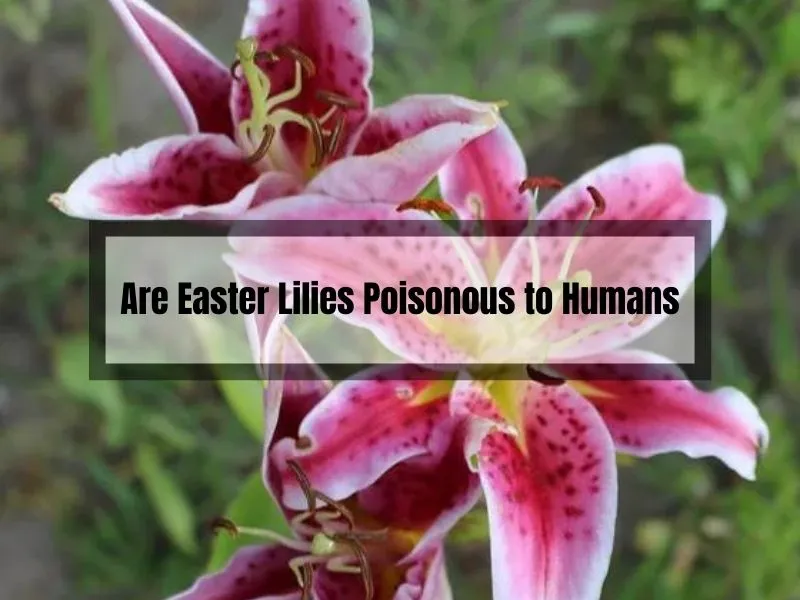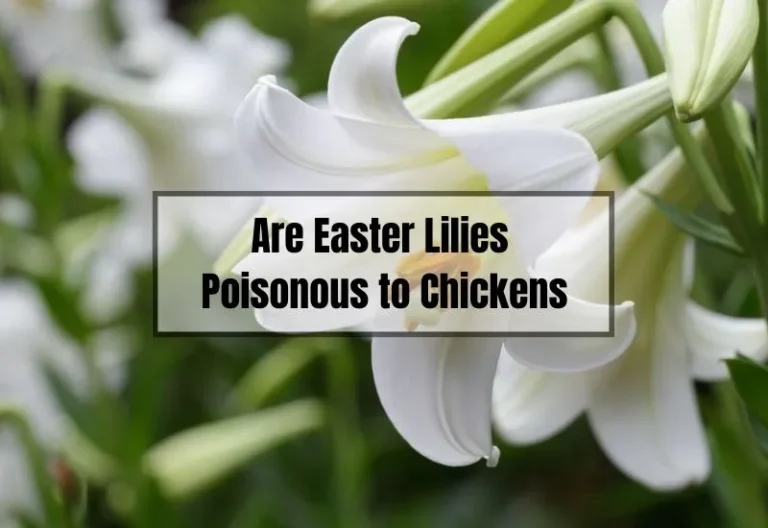Are Easter Lilies Poisonous to Humans? A Comprehensive Guide
As Easter approaches, it’s crucial to understand the potential dangers associated with Easter lilies. These beautiful flowers, commonly used in Easter decorations and gifts, are highly toxic if ingested.
This toxicity is due to a substance called lycorine, which can lead to symptoms such as vomiting, diarrhea, abdominal pain, and seizures.
In severe cases, Easter lily poisoning can be fatal. If you suspect someone has ingested any part of an Easter lily, seek immediate medical attention to ensure safety.
Key Takeaways
- Easter lilies can be highly toxic to humans if ingested.
- Symptoms of Easter lily poisoning can include vomiting, diarrhea, abdominal pain, and seizures.
- Seeking medical attention immediately is crucial if you suspect Easter lily poisoning.

Are Easter Lilies Poisonous to Humans?
Gardening enthusiasts often adorn their homes and gardens with beautiful flowers, including Easter Lilies with their iconic white trumpet-shaped blooms. However, it’s important to note that Easter Lilies can be toxic to both humans and pets if ingested.
According to the North Dakota State University College of Agriculture, all parts of the Easter Lily plant are toxic, including the leaves, stems, and flowers.
The severity of toxicity depends on the amount consumed and the individual’s size and weight. While Easter Lilies are not typically lethal to humans, they can cause discomfort, illness, and, in severe cases, require medical attention.
Symptoms of Easter Lily poisoning may include dizziness, stomach pain, and possible collapse, along with nervous system paralysis, irregular heart rate, confusion, digestive upset, diarrhea, or vomiting. Immediate medical attention is crucial if ingestion occurs.
It’s worth noting that Easter Lilies are not the only toxic flowers; other plants like lily hybrids, Asiatic and Japanese lilies, and daylilies can also pose risks to humans and pets. For those with pets, it’s advisable to avoid planting toxic flowers in your garden or keeping them indoors.
Easter Lilies can be toxic if ingested, necessitating awareness and precautions to ensure the safety of ourselves and our loved ones.
What are Easter Lilies?
Easter lilies are a type of lily that is commonly associated with the Easter holiday. These flowers are known for their large, trumpet-shaped blooms and sweet fragrance.
They are often used in bouquets and floral arrangements, and can be found in many homes and churches during the Easter season.
What Makes Easter Lilies Toxic?
While Easter lilies are beautiful, they can be extremely toxic to humans, especially if ingested. The entire plant, including the leaves, flowers, and stem, contains a substance called lycorine, which can cause a range of symptoms when ingested.
Effects of Easter Lily Poisoning

If you or someone you know has ingested Easter lilies, it’s important to know the potential effects of poisoning. Easter lilies contain toxins that can be harmful to humans, especially if ingested in large amounts.
Some of the symptoms of Easter lily poisoning include:
- Nausea and vomiting
- Abdominal pain
- Diarrhea
- Loss of appetite
- Confusion
- Irregular heartbeat
- Seizures
If you experience any of these symptoms after ingesting Easter lilies, seek medical attention immediately.
It’s important to note that not all lilies are toxic to humans. However, it’s best to err on the side of caution and avoid ingesting any part of the Easter lily plant.
If you suspect that your pet has ingested Easter lilies, seek veterinary attention immediately. Lilies are highly toxic to cats and can cause kidney failure, which can be fatal if left untreated.
Ingesting Easter lilies can be especially dangerous for children and pets, so it’s important to keep them out of reach. If you have Easter lilies in your home, make sure they are placed in an area that is inaccessible to children and pets.
Remember, prevention is key when it comes to Easter lily poisoning. By taking the necessary precautions, you can help ensure the safety of yourself, your family, and your pets.
Prevention and Safety Measures
Now that we know how dangerous Easter lilies can be, it’s important to take steps to prevent accidental ingestion and keep ourselves and our loved ones safe. Here are some prevention and safety measures to consider:
- Educate yourself and others: It’s important to know which plants are toxic and which ones are safe. Share this information with your family, friends, and neighbors to help prevent accidental ingestion.
- Keep Easter lilies out of reach: If you have children or pets, it’s important to keep Easter lilies out of reach. Place them in areas where they cannot be easily accessed.
- Wash your hands: After handling Easter lilies, be sure to wash your hands thoroughly with soap and water. This will help prevent accidental ingestion.
- Seek medical attention if necessary: If you or someone you know has ingested Easter lilies, seek medical attention immediately. Time is of the essence when it comes to poisoning, so don’t wait.
- Consider alternative plants: If you want to decorate your home with flowers during the Easter season, consider alternative plants that are safe for humans and pets. Some options include daffodils, hyacinths, and tulips.
Remember, prevention is key when it comes to avoiding Easter lily poisoning. By taking these simple steps, we can keep ourselves and our loved ones safe during the holiday season.
The Impact of Easter Lilies on Pets
Are Easter Lilies Poisonous to Cats?
- Symptoms of lily poisoning in cats
While Easter lilies aren’t highly toxic to humans, they can be extremely dangerous for our feline friends. If your cat ingests any part of an Easter lily, they may experience the following symptoms:
- Vomiting
- Diarrhea
- Loss of appetite
- Increased or decreased urination
- Lethargy
- Dehydration
- Seizures
- What to do if your cat ingests an Easter lily
Time is of the essence if your cat has consumed an Easter lily. Seek immediate veterinary assistance, as prompt treatment is crucial to prevent potentially fatal kidney failure.
Are Easter Lilies Poisonous to Dogs?
- Symptoms of lily poisoning in dogs
Easter lilies are not considered highly toxic to dogs. However, if your dog ingests a large amount of the plant, they may experience mild gastrointestinal upset, such as vomiting or diarrhea.
- What to do if your dog ingests an Easter lily
If your dog consumes an Easter lily, it’s a good idea to monitor them closely for any signs of distress. If they show severe symptoms or appear to be in pain, consult your veterinarian immediately.
FAQs
Here are some frequently asked questions about Easter lilies:
What other types of lilies are poisonous to humans and pets?
While Easter lilies are not highly toxic to humans, other lily varieties, such as the tiger lily (Lilium lancifolium), can pose a risk. Tiger lilies, Asiatic lilies, and daylilies can be harmful to both humans and pets if ingested, causing symptoms ranging from mild gastrointestinal upset to severe kidney failure in cats.
What should I do if I or my pet ingests an Easter lily?
If you or your pet ingests an Easter lily, seek medical attention immediately. Call your doctor or veterinarian right away and provide them with as much information as possible about the plant and the symptoms you or your pet are experiencing.
Can I eat the pollen of Easter lilies?
It’s not recommended to eat the pollen of Easter lilies, as it can cause mild gastrointestinal discomfort if ingested. Additionally, some individuals may have an allergic reaction to the pollen, leading to more severe symptoms.
How can I tell if my lily is an Easter lily or another type of lily?
Easter lilies (Lilium longiflorum) are characterized by their large, trumpet-shaped, white flowers and a sweet, distinct fragrance. If you’re unsure about the type of lily you have, it’s best to consult a local gardening expert or nursery for accurate identification.
Can the scent of Easter lilies cause allergies?
Some individuals may be sensitive to the fragrance of Easter lilies and experience allergic reactions, such as sneezing, watery eyes, and a runny nose. If you or someone in your household is sensitive to floral scents, consider using unscented lilies or artificial alternatives to avoid triggering allergy symptoms.
Conclusion
In summary, while Easter lilies are not considered highly toxic to humans, it’s essential to handle them with care and keep them away from pets and young children.
By following the guidelines provided in this article, you can continue to enjoy the beauty and elegance of Easter lilies while keeping your home safe for everyone. So go ahead, embrace the festive spirit and fill your home with these gorgeous blooms – just remember to stay vigilant and keep an eye on those curious critters and little ones!






